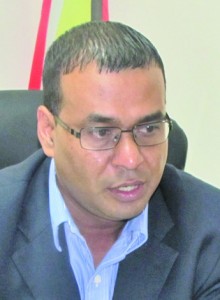– says EPA making strides in preventing pollution

Environment Minister
Robert Persaud
The Natural Resources and Environment Ministry has chided the A Partnership for National Unity (APNU) for its “double standards” on certain issues while endorsing a green economy.
The ministry’s comments come in wake of APNU’s criticism of government’s management of environmental issues as it called for the administration to develop a comprehensive strategy. Last Friday, Opposition Leader and APNU Chairman David Granger, during the coalition’s weekly press conference, said such a strategy was needed to protect the population from hazards, to preserve the environment from further degradation, and to create a sustainable ‘green’ economy in the shortest possible time.
On Sunday, in an eight-page press statement, the ministry criticised APNU’s stance on the creation of enabling factors for an environmentally friendly and sustainable Guyana. The ministry accused APNU of rejecting the government’s proposal for environmental tax for all plastic receptacles and its non-support for major low-carbon development projects such as the Amaila Falls Hydropower project. According to a feasibility study, the hydropower project would have replaced more than 95 percent of the fossil fuels used for the generation of electricity.
“The internationally recognised and supported Low Carbon Development Strategy (LCDS) provides visionary framework that will allow Guyana to build a model ‘green economy’. Much investments and work have commenced with the participation of all stakeholders on making this a reality,” the ministry pointed out.
On the local scene, the ministry said it had crafted its strategic plan with backing from the United Nations Development Programme (UNDP).
Pollution
In the area of pollution, the ministry said currently the Environmental Protection Agency (EPA) was not playing an active role in the area of enforcement in keeping with its act of 1996 as a result of the extensive period for matters to achieve closure in the courts. But to cushion the impact, the agency is in the process of finalising Environmental Protection (Enforcement and Compliance) Regulations. In preparing for these regulations at an institutional level, the EPA established a new division in June 2013 to deal with enforcement and compliance.
“The issues related to hazardous wastes and air quality pollution have also been recognised, and back in 2011, the EPA established a Hazardous Wastes/Materials and Air Quality Management Unit. Since then, the EPA secured an air quality field meter to measure and monitor particulate matter, and which has been deployed to resolve a number of complaints.”
The ministry alluded to the Hack Rice Mill, Cane Grove case which has been successfully resolved. “The numerous recommendations which were made by the EPA and implemented by the rice mill were scientifically tested with the acquisition of the particulate matter meter. Results from the air quality monitoring, which was conducted from February 20, 2012 to March 18, 2012, revealed that particulate matter concentrations were below the World Health Organisation guidelines…”
The work of the environmental agency continues with investigation and monitoring of several other operations. The agency has moved to establish an air quality monitoring protocol for Linden, with implementation to occur shortly.
“EPA is well aware of the constraints of having only one meter for monitoring air quality, and intends to acquire two other field instruments in 2014 to further support its investigation and monitoring operations.”
Two years into its operation, with a staff complement of three officers, the unit is still in the incipient stages of administering the hazardous wastes regulations. The environmental guidelines have been completed for the proper storage, transportation and occupational handling of biomedical waste. Additionally, the agency has conducted a series of consultations with stakeholders from private and government entities on the effective management of hazardous wastes.
Turning its attention to water pollution, the body is in the process of establishing a Water Quality Unit.
In recognition and support of the steps taken by the agency, the Guyana Geology and Mines Commission has stepped in, actively conducting water quality and turbidity tests, as part of its monitoring and enforcement exercises in various mining districts.
Earlier this month, the ministry signed on to a new international pact to control mercury emissions.



